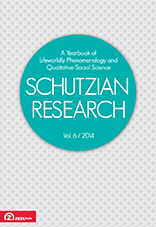Reflections on a Phenomenology of Power
Reflections on a Phenomenology of Power
Author(s): Jochen DreherSubject(s): Philosophy
Published by: Zeta Books
Keywords: Power; life-world; habitus; theory of relevance; construction; constitution; Alfred Schutz; Pierre Bourdieu;
Summary/Abstract: A frequent accusation directed at phenomenology and phenomenologically oriented sociology is that of power oblivion. Edmund Husserl’s phenomenology is accused of not considering the social conditions of the possibility of the doxic experience of the world, and Alfred Schutz’s social phenomenology is blamed for neglecting the social structural preconditions of the experience of everyday reality. Based on this criticism, it is argued that the objectively given power structures, which infl uence the subjective experience, are not considered in Schutz’s social phenomenological refl ections. Bourdieu proclaims that the experience of the social world as being self-evident, as “taken for granted” in Schutz’s words, is taken into consideration without a reference to social conditions such as hierarchies of power. I will reject this reproach by demonstrating the specific potential of Schutz’s theory of the life-world and especially his theory of relevance to conceptualize the phenomenon of power with reference to the subjectivity of the individual actor. Th e theory of life-world off ers a conceptual scheme with a specifi c capacity to capture theoretically the interrelation of subjective constitution and objective construction of power.
Journal: Schutzian Research. A Yearbook of Lifeworldly Phenomenology and Qualitative Social Science
- Issue Year: 2013
- Issue No: Volume 5
- Page Range: 103-119
- Page Count: 17
- Language: English
- Content File-PDF

